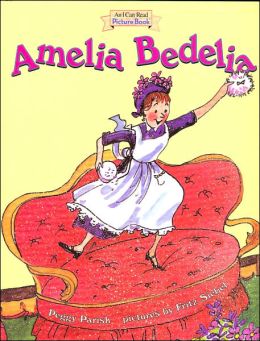2018 School Spending Survey Report
Librarians React to 'Amelia Bedelia' Hoax
When New York writer EJ Dickson publicly confessed to fabricating information on the Wikipedia page for Amelia Bedelia author Peggy Parish, it was a “teachable moment” according to one librarian.

'Amelia Bedelia' by Peggy Parish.
Last month, New York-based writer and editor EJ Dickson confessed in a July 29 article on the Daily Dot that, five years ago, as a sophomore in college, she had edited Wikipedia articles with false information—including the page for Peggy Parish, the author of the "Amelia Bedelia" book series. As a joke, both Dickson and a friend submitted that the character was inspired by a maid Parish had met in Cameroon who was known for her many feathered hats, a fabricated story. The falsehood was never taken off the site and has since been quoted as fact in numerous publications, including Iowa’s Waterloo-Cedar Falls Courier, much to Dickson’s surprise. While Dickson’s admission cleared her conscience, it also called into question what is considered a credible source and started a larger discussion about the value of information and the importance of evaluating information sources. “It’s the kind of fact that’s not going to hurt anybody, but it’s muddying the water as far as the real truth goes,” said Shayne Russell, a librarian at Kenneth R. Olson Middle School in Tabernackle, New Jersey. “I just think [Dickson’s prank] falls into the category of [ir]responsible online citizenship. It’s not doing a lot of damage, but it’s irresponsible. None of us... want to see kids getting involved in this.” While Russell, who has been a middle school librarian for two decades, isn’t thrilled about misinformation being propagated, she doesn’t want to demonize Wikipedia entirely. “Social media is here to stay. Middle school kids need to know how to deal with it,” she said. “I want kids to learn how to be a member of a community that adds value to the community.” She points out that false facts were disseminated long before the Internet, saying, “Kids would find a mistake in the Encyclopedia Britannica. We’ve always had information that wasn’t right that got published in more than one place. It’s just more noticeable on Wikipedia, I guess.” At North Hunterdon High School in Annandale, New Jersey, school librarian Martha Hickson is using the hoax as a lesson plan. “My thought as a librarian, desperately trying to teach high school students to ascribe value to information and information sources, is that it’s a fantastic teachable moment,” she said. Besides mentioning Dickson’s prank, Hickson talks about the oft-repeated myth that Ian Gutgold invented the hair straightener—a false fact that still crops up in Google searches. Still, perhaps the greatest example to drive home her point is given by the students. “I ask them if they have ever edited a Wikipedia entry,” she said, “and four or five [students] will raise their hands.” Deb Logan, the media specialist at the Mount Gilead Middle School / High School in Mount Gilead, Ohio, has a similar approach. “I look for examples about why my kids need to question sources, and here’s one I’ll add to my file,” she said. Also in the file is the false accusation that John Seigenthaler, a pallbearer at Robert Kennedy’s funeral, was involved in his assassination. Moreover, Logan uses the song “Summer Nights” from Grease as an example of how the truth can be adjusted depending on who’s telling it. “I want kids to question sources, not just Wikipedia. I want them to look at websites and say, ‘Who is the author?’ Look at who links to the site. The fact that a reputable source links to them would lend some credibility.” Hickson agrees. “The fundamental principal of librarianship is to match the information source for the information need,” she said. “It’s my responsibility as a consumer to go to the very best sources for the information I need. Buyer beware.” Logan and Hickson both state that educating students on placing value on information sources is imperative. Logan uses a worksheet that students fill out as they start using the Internet to get them used to looking for certain attributes, like authorship and the URL ending. Hickson has similar lesson plans. “Among the skills I teach my students are skills associated with Web evaluation,” she said. “First and foremost, look for statement of authorship and credentials. Make sure the credentials match the subject matter. Look at the [currentness] of [the] content, and look at the qualities of the site in general, like spelling and grammar errors. We introduce this to them as freshman, and they find it very arduous.” Even harder than discerning a reputable site from a discredited one is stopping the rapid dissemination of false information. “Whatever it is that you’re doing, even if you’re just fooling around, your actions have consequences,” Russell said. “Even if you don’t know it until five years later.”Carly Okyle is a freelance journalist who has written for FamilyCircle.com, YourTango.com, and Guideposts magazine. Her blog “The D Card” is candid look at living with disability issues.
RELATED
RECOMMENDED
CAREERS
The job outlook in 2030: Librarians will be in demand
CAREERS
The job outlook in 2030: Librarians will be in demand
ALREADY A SUBSCRIBER? LOG IN
We are currently offering this content for free. Sign up now to activate your personal profile, where you can save articles for future viewing






Add Comment :-
Comment Policy:
Comment should not be empty !!!
Lydia Knight
Shades of H. L. Mencken's bathtub hoax article!Posted : Sep 03, 2014 01:32
Bini Szacsvay
I teach m students that NO website is guaranteed to be correct, therefore they should refer to at least three sites to verify the facts.Posted : Aug 29, 2014 05:22
Elaine McKenna
I am interested in viewing the false version of the article in the Wikipedia history. Can you provide a link to it? Thanks.Posted : Aug 27, 2014 11:00